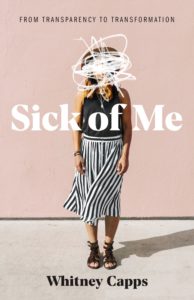Whitney Capps is a national speaker for Proverbs 31 Ministries and a writer for the new Bible app, First 5, reaching more than 1,000,000 people daily. As a Bible study geek, Whitney’s delight is to dig into God’s Word for profound yet practical truth. A communicator at heart, Whitney comes alive by sharing those truths with any gal who will give her even a few minutes. In her former life she served as a talent acquisitions professional at Chick-fil-A’s corporate office, which gave her a deep love for helping women connect their passion with their purpose for the glory of God.
A girly-girl living with all boys, Whitney and her husband Chad are raising their four sons, Cooper, Dylan, Ryder, and Tate just outside Atlanta, Georgia. Her house is wild, loud, and littered with Legos. Whitney is addicted to shoes, jewelry, and ice crunching. Additionally, Whitney served her community as her local Bible Study Fellowship Teaching Leader.
Whitney’s latest book is Sick of Me: From Transparency to Transformation. Whitney shows us that spiritual growth means being both honest and holy—that we can come to Jesus just as we are, but we cannot stay that way. While virtues like vulnerability, honesty, and humility are desperately needed, we should fight for more. After all, the gospel is a change-agent.
We had a chance to talk with Whitney about her new book and how she hopes God uses it in the life of women…
What launched you into writing?
Really it was a love of teaching God’s Word and writing for the First 5 app with Proverbs 31 Ministries. I feel a kind of nervous energy when I discover something true and helpful in Scripture, and I can’t wait to tell other women about it!
What prompted you to write Sick of Me, and on this particular topic?
I have noticed a new kind of obsession within the Christian community with transparency and vulnerability. These are virtues for sure, but I began to wonder if we were staying too focused on our brokenness and getting stuck in a transparency trap. Were we missing the transformational goal of the Gospel? Originally, I was just curious and went to understand what the Bible has to say about authentic community and transformation. Ultimately, “Sick of Me” was the result.
What is the difference between transparency and transformation, and how those two play out in our relationships and culture?
Transparency is honesty about the brokenness of our souls, but it can also be the honest celebration of gospel change and spiritual maturity. Within modern church culture, we’re far more comfortable with the former than the latter. Biblical authenticity is letting God have glory for all the work the Gospel does both to convict and to change us. Transformation is what happens when we commit our brokenness and a desire to be better to the Holy Spirit. He changes us. We can testify that the gospel actually works!! It didn’t just save me; the Gospel sanctifies me.
work the Gospel does both to convict and to change us. Transformation is what happens when we commit our brokenness and a desire to be better to the Holy Spirit. He changes us. We can testify that the gospel actually works!! It didn’t just save me; the Gospel sanctifies me.
Vulnerability, accessibility, honesty, and humility are all great virtues – but why is it so crucial that we go beyond these virtues in our communities and churches?
These virtues are a means, not an end. They are a part of a greater, more necessary conversation about conviction and change. If we aren’t committed to moving through that necessary process then our honesty and transparency serve only to make us feel better about ourselves or to deflect the actual accountability that God wants to use to mature us. Community isn’t for us to know one another better; it’s meant to help us know Christ better.
Why do we need to “avoid the transparency trap” as you discuss in chapters 9-10?
Without a real commitment to see these virtues submitted to the Holy Spirit, we can become a people who say “I’m broken; you’re broken.” That’s just a spiritualized version of “you’re okay; I’m okay.” Transparency makes us feel like we are demonstrating the proof of spiritual growth, but we haven’t actually let God’s Word transform us. That kind of immature transparency arrests the spiritual growth of an entire generation of believers. Unless we allow God’s Word to change us, in twenty years, we will all be very honest, very broken, very transparent spiritual infants.
Tell us about the companion Bible study, We Over Me. How does it differ from the book, as well as complement it? Can they be used together?
They can be used together, but each examines the doctrine of sanctification very differently. “Sick of Me” looks at how God changes and sanctifies us individually while “We Over Me” challenges us to see the way God wants to use our local churches to change us and the world. Think of one as more individual prescription, and the other as a more corporate prescription.
How do you hope women grow from reading this book?
I hope we more passionately crucify the “selfie” mentality that so subtly infiltrates our communities and churches. Can you imagine how the Gospel might advance if we were committed to mature transparency that celebrates what the Gospel does with women who are broken but dedicated to becoming better? I’d love to see us become more concerned with what Jesus wants to do in us than with what others think about us. I’d like to believe that our vulnerability is an avenue for the Gospel, not our own glory.
You Might Also Like
Lifeway lleva a cabo exitoso lanzamiento internacional de la EBV en Ciudad de México
Reflexión: Ausencia divina
Lifeway llevó a cabo la conferencia Transformados a Su imagen en Monterrey, México
La Importancia de Utilizar la Biblia Adecuada para un Estudio Detallado
Lifeway / B&H Español presente en Fieles a Su Llamado 2023
